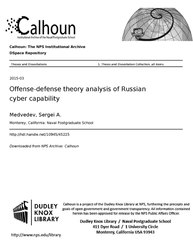File:Offense-defense theory analysis of Russian cyber capability (IA offensedefenseor1094545225).pdf

Original file (1,275 × 1,650 pixels, file size: 1.21 MB, MIME type: application/pdf, 110 pages)
Captions
Captions
Summary
edit| Offense-defense theory analysis of Russian cyber capability
( |
||
|---|---|---|
| Author | ||
| Title |
Offense-defense theory analysis of Russian cyber capability |
|
| Publisher |
Monterey, California: Naval Postgraduate School |
|
| Description |
The Russian Federation is a key state actor in cyberspace; cyber events associated with Russian state and non-state actors have threatened Russia’s neighbors, shaped international cyber norms, as well as influenced strategists’ understanding of cyber power. This thesis seeks to understand Russian cyber capability through the lens of Robert Jervis’s offense-defense theory in order to answer the thesis’s central question: Do Russian cyber capabilities reflect an investment in offensive or defensive cyber weapons, and do Russia’s cyber technology, doctrine, and policy differentiate its posture as offensive or defensive? To evaluate Russian cyber capability, this thesis considers two factors—technology and geography—concluding that, although the Russian government is modifying its cyber terrain to improve defensiveness, Russia’s brandished cyber weapons suggest that it pursues offensive capability. To evaluate Russia’s posture differentiation, the thesis examines Russians’ understanding of cyber power, Russian information warfare and hybrid warfare doctrines, and the country’s international engagements, concluding that, although Russia has historically presented its posture as defensive, it is increasingly difficult to make that distinction. Finally, the thesis evaluates this state-level analysis in the broader context of the international system; Russia’s historical aggression and current behavior in cyberspace likely reflects Stephen van Evera’s explanATOry hypothesis for the causes of war—defensive expansion. Subjects: Russia; cyber; cyberspace; offense-defense theory; information warfare; hybrid warfare. 15.NUMBER OFPAGES 109 |
|
| Language | English | |
| Publication date | March 2015 | |
| Current location |
IA Collections: navalpostgraduateschoollibrary; fedlink |
|
| Accession number |
offensedefenseor1094545225 |
|
| Source | ||
| Permission (Reusing this file) |
This publication is a work of the U.S. Government as defined in Title 17, United States Code, Section 101. Copyright protection is not available for this work in the United States. | |
Licensing
edit| Public domainPublic domainfalsefalse |
This work is in the public domain in the United States because it is a work prepared by an officer or employee of the United States Government as part of that person’s official duties under the terms of Title 17, Chapter 1, Section 105 of the US Code.
Note: This only applies to original works of the Federal Government and not to the work of any individual U.S. state, territory, commonwealth, county, municipality, or any other subdivision. This template also does not apply to postage stamp designs published by the United States Postal Service since 1978. (See § 313.6(C)(1) of Compendium of U.S. Copyright Office Practices). It also does not apply to certain US coins; see The US Mint Terms of Use.
|
 | |
| This file has been identified as being free of known restrictions under copyright law, including all related and neighboring rights. | ||
https://creativecommons.org/publicdomain/mark/1.0/PDMCreative Commons Public Domain Mark 1.0falsefalse
File history
Click on a date/time to view the file as it appeared at that time.
| Date/Time | Thumbnail | Dimensions | User | Comment | |
|---|---|---|---|---|---|
| current | 12:46, 23 July 2020 |  | 1,275 × 1,650, 110 pages (1.21 MB) | Fæ (talk | contribs) | FEDLINK - United States Federal Collection offensedefenseor1094545225 (User talk:Fæ/IA books#Fork8) (batch 1993-2020 #23775) |
You cannot overwrite this file.
File usage on Commons
The following page uses this file:
Metadata
This file contains additional information such as Exif metadata which may have been added by the digital camera, scanner, or software program used to create or digitize it. If the file has been modified from its original state, some details such as the timestamp may not fully reflect those of the original file. The timestamp is only as accurate as the clock in the camera, and it may be completely wrong.
| Short title | Offense-defense theory analysis of Russian cyber capability |
|---|---|
| Author | Medvedev, Sergei A. |
| Software used | Medvedev, Sergei A. |
| Conversion program | Adobe PDF Library 11.0 |
| Encrypted | no |
| Page size | 612 x 792 pts (letter) |
| Version of PDF format | 1.4 |

